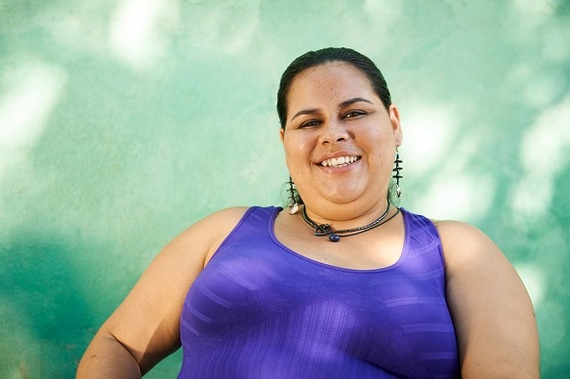Last week, I was at an event at which a woman was sharing the story of a tough time in her life. (For the purposes of this article, we'll call this woman Jane). Jane had been going through a difficult season in life. When she reached a point that she believed was rock bottom, she sought guidance from someone who she considered a trusted mentor. His (very questionable) 'tough love' approach made her feel even worse. To paraphrase, he said something like, "I can't believe you can't make it through this. You're a loser. You're fat and lazy and have nothing going for you."
Some mentor, huh?
Although I have opinions about his approach (I don't think you can call it "tough love" without the "love"), I share this story because I noticed something interesting about the room's response. About 40 women were present. As Jane recalled her mentor's unkind comments, one word in particular seemed to elicit the strongest emotion from the group. Collectively, their reaction showed that if they had to rate the things he called her from most-to-least hurtful, one adjective would clearly be considered the lowest blow.
If you're a woman reading this, you know what word I'm talking about.
The "F" word. Fat.
For a woman in our society, being called fat is worse than being called lazy. It's worse than someone telling us that we have nothing going for us. It's even worse than being called a loser.
But should it be?
In doing the work that I do, I'm tuned in to the things that we as women say about food and body, and I pay attention when I see our words and behaviors reflect common paradigms in our society. I'm especially attuned to paradigms that I interpret as dangerous, because of how they work to keep women small.
Our collective view of "fat" as the worst thing a woman can be called is one of these paradigms.
Think about it. If we believe that "fat" is the worst thing we can be, it makes perfect sense for us to do everything we can to not be fat. As we endeavor towards this goal, we expend a significant amount of mental energy. We direct much of this energy towards thinking about what/when/how much we should be eating and exercising. The remainder, a not-insignificant chunk, goes towards evaluating our bodies, beating ourselves up when the mirror doesn't reflect what we think it should, and comparing ourselves to others.
When I start working with a new client, I often ask her to estimate what percentage of her daily mental energy she spends thinking about food and body. The answers have ranged from 50% to 95%. I can relate. When I was obsessed with being healthy (and of course, with not being fat), almost all of my thoughts were in this realm.
Here's where it gets scary. As Naomi Wolf wrote in The Beauty Myth:
"A culture fixated on female thinness is not an obsession about female beauty, but an obsession about female obedience. Dieting is the most potent political sedative in women's history; a quietly mad population is a tractable one."
This quote gets my heart racing. Although I don't believe that an evil Big Brother is purposefully enacting a plan to promote an obsession with thinness as a way to keep women sedated and obedient, it's clear that the inordinate amount of energy we direct towards thinking about food and body is energy that we're not using for arguably better purposes -- like living out our highest potential. As long as we believe that 'fat' is the worst thing we can be, and behave accordingly, we will not have the energy to rise up and live in the fullness of who we are.
I think Naomi is right that we are, by and large, a "quietly mad population" -- because when you really think about it, isn't it madness that of all of the insults that could be hurled at us, we perceive "fat" as the worst?
The kicker is that we women are often the ones perpetuating this way of thinking. Every time we get up in arms when we hear that one of our sisters was called fat, we make it worse. Our reaction cements the "women must remain tractable" paradigm even more firmly in place.
Ladies, we ARE society. As comfortable as it is to point outward when talking about where change needs to happen, the truth is that we change societal norms one person at a time. In this case, this means looking inward to change the way we feel about the word "fat." It means accepting that 'fat' is simply a descriptive word with no morality attached, like "warm," or "yellow."
Would you like to join me in creating a new paradigm, one that rewards women for investing their energy into reaching their full potential instead of their ideal weight? Here's how:
The next time you hear the word "fat" used or perceived as the ultimate way to insult a woman, do your best to react neutrally. As we collectively make this a practice, we will remove the negative charge of being called fat. In doing so, we free ourselves from the shackles of an obsession with thinness.
What WILL we do with all of this newly released energy?
I can't wait to find out.

